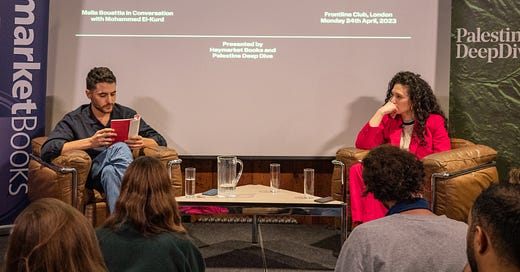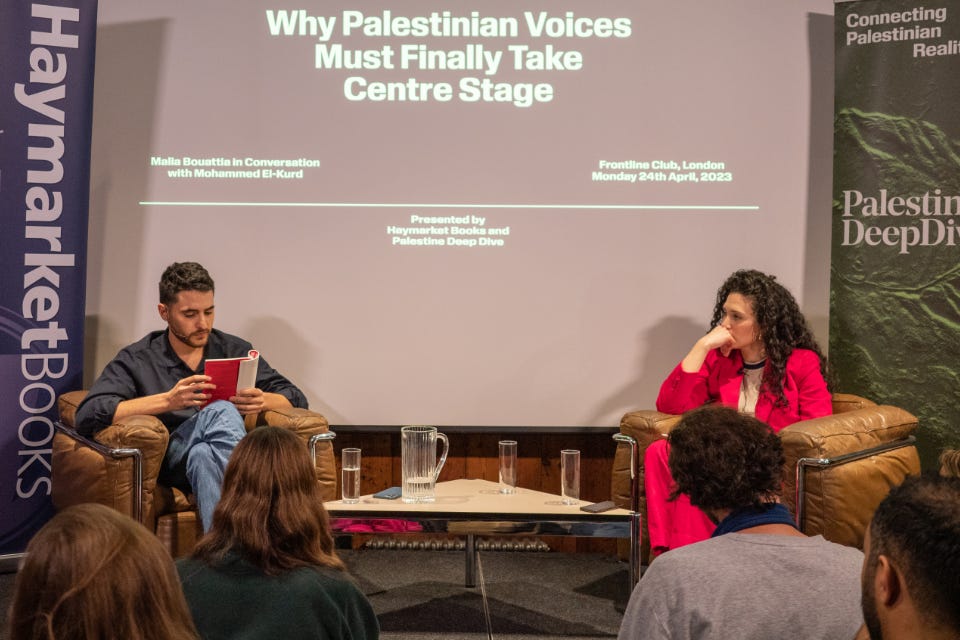Exploring the pressing need for a media landscape which no longer marginalises and excludes Palestinians, but centres their voices, experiences and agency, Palestine Deep Dive (PDD) held its second ever in-person event last week, and its first in London in collaboration with Haymarket Books.
They hosted award-winning Palestinian poet, journalist and organiser Mohammed El-Kurd in conversation with Malia Bouattia, the Opinion Editor of The New Arab, at the Frontline Club, Paddington. On his first visit to the UK, El-Kurd also sat down with Novara Media, Double Down News and Jeremy Corbyn’s Peace and Justice Project for sessions around media bias and reform, which PDD proudly helped facilitate.
In 2021, El-Kurd published RIFQA, his debut collection of poetry with Haymarket Books. That same year he was named one of the 100 most influential people in the world by TIME Magazine alongside his sister Muna for their role as leading voices in the #SaveSheikhJarrah movement. He currently serves as the first ever Palestine Correspondent for The Nation.
Speaking from first hand experience to an audience of journalists and campaigners, El-Kurd presents a multifaceted critique of mainstream media coverage on Palestine, from the decades-long systematic exclusion and underrepresentation of Palestinian voices to the outright dehumanising presentation of Palestinians enduring Israel’s occupation.
He offers suggestions to independent platforms and media giants alike on how to quickly improve their reporting if they are truly committed to presenting informed and accurate news, and also how other young Palestinians can be bolder and more assertive in articulating their own discourse and presenting their narrative.
With Israel’s attempted erasure of the Palestinian people accelerating by the day, PDD’s Omar Aziz preceded the discussion by drawing attention to the urgent need to find new ways of connecting Palestinian realities to Western audiences.
He drew attention to the ease of centring Palestinian voices on the ground today, even for small media platforms using household streaming services such as Zoom, and asks, “So what excuse does a multimillion-pound international news station have with teams of correspondents, producers, and editors not to be able to do the same?”
Opening up the conversation, Bouattia asks El-Kurd about the rationale behind his uncompromising approach to interviews with the mainstream media. He emphasises how Palestinians are still struggling against decades of dehumanisation:
“When you turn the question on its head, when you correct the presenter, you are changing the power dynamic in the interview itself. You are having the observer, the viewer question the integrity of that media platform and thus give you more authority on the subject. For me, the most important aspect of going on these TV shows has been, can I do this and still maintain my dignity? Because we are so starved for representation as Palestinians and because we have been so demonised across history, particularly after the First Intifada and we have been depicted as terrorists. We tend to back into a corner when we're attacked with these types of questions, and we tend to defend ourselves and we tend to start our statements with a million disclaimers and qualifiers and somehow rebelling against that is able to turn the question on its head and it is empowering for the viewer. That's why I do it.”
When asked whether there is much to learn from the approach of pro-Israel media platforms and media watch groups, El-Kurd responds:
“Yes. We have the truth on our side, but the truth is not enough. Those of us who are advocates, who go on TV, must acquire a certain kind of political education, must know what the hell they're talking about before they go on TV. It is not enough to be just a subject of violence, it's not enough to just have the bruises. You must also be able to be compelling… I think about the 2021 campaign for Sheikh Jarrah and the fact that it was mostly successful in halting the expulsion orders against our families was the fact that it was completely volunteer-led, and it was hundreds of thousands around the world that were participating in it, that were taking the time out of their day to protest, to tweet, to divest, to create work in their cities, and so on and so forth. We went against one of the most highly-funded foreign ministries in the world, and we beat them in the narrative. Imagine how powerful we could have been should we have that training, should we have the resources, and the infrastructure. ”
Asked if he has the luxury to put in demands around interviews, El-Kurd responds:
“I usually demand that it's a live interview. You should not care what the interviewer is asking. You have a talking point to deliver. You have a narrative to deliver, so you deliver it. Yes, I think that's really the most important thing you should always expect if you're going on mainstream media. Honestly, after some of the interviews I’ve done here, even going on leftist media, you're going to get stupid questions, and you should know not to be derailed, not to be distracted by these questions.”
Mentioning that in 1984, union members refused to publish The Sun’s front page picture of the National Union of Miners’ leader Arthur Scargill, which froze him in a pose misleadingly imitating a Nazi salute, Bouattia asks whether El-Kurd feels journalists and workers in mainstream media outlets can do more to exert pressure on their editors to report the truth.
El-Kurd: “Yes. People should be a lot more bold and a lot more courageous. I say this from just engaging with journalists who work at the New York Times and who work at the Washington Post who have their hearts in the right place, and they have the right sentiment and they even know the facts… Then when their editor changes something in their piece, they just go, ‘Oh, fuck,’ and they drink a cocktail and go home. They don't push back against their editors. It's quite cowardly. If we are serious about this, then we must run the risk of sacrifice. Across history, any opposition to any injustice has not been met with applause initially.”
El-Kurd emphasises that while leftist media platforms can be ideal spaces for young Palestinians to gain media experience, the platforms themselves still often retain problematic positions on Palestine:
“I think certainly they are and they could be training spaces, but even observing the UK or the United States, these so-called leftists or progressive media outlets, oftentimes do not even have a principled stance on Palestine. They often engage in this qualification policy, where they can only speak about Palestine if they spent fifteen minutes denouncing all kinds of bigotry and racism as if Palestine is inherently tied to a certain bigotry. We saw how some leftist media organisations dealt with accusations against Corbyn, for example and how they conceded, how they gave heft to these baseless, incredibly bogus and outrageous accusations that are designed to silence advocates for Palestine. Maybe I'm too cynical, but there's lots of work to be done.”
Rounding off the conversation, El-Kurd reiterated that Palestinians are not asking for an easy ride in the media, but simply calling upon journalists to do their jobs:
“We're not asking them to do us any favours. We're asking them to do their jobs. When you are writing an article about a raid on Al-Aqsa Mosque and the first quote you start with, and the last quote you end with, is from the Israeli police you are not a journalist, you're a stenographer. When you are writing an essay about forced expulsions in Sheikh Jarrah , and the only people you're referencing is the Israeli Ministry of Foreign Affairs, you're not a journalist, you're a state secretary so do your jobs. Thank you.”





